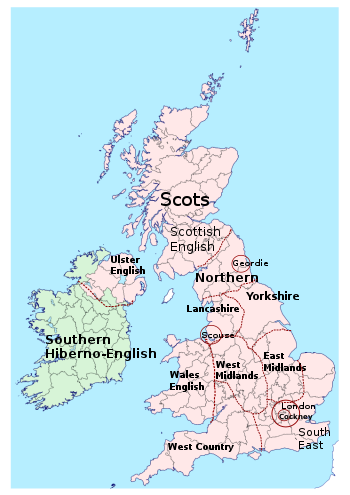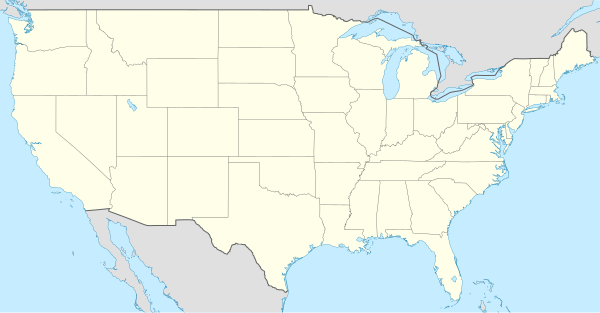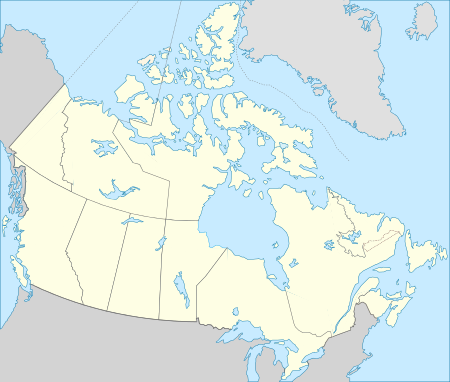List of dialects of English
Dialects are linguistic varieties that may differ in pronunciation, vocabulary, spelling and grammar. For the classification of varieties of English only in terms of pronunciation, see regional accents of English.
Overview[]
Dialects can be defined as "sub-forms of languages which are, in general, mutually comprehensible."[1] English speakers from different countries and regions use a variety of different accents (systems of pronunciation) as well as various localized words and grammatical constructions; many different dialects can be identified based on these factors. Dialects can be classified at broader or narrower levels: within a broad national or regional dialect, various more localised sub-dialects can be identified, and so on. The combination of differences in pronunciation and use of local words may make some English dialects almost unintelligible to speakers from other regions without any prior exposure.
The major native dialects of English are often divided by linguists into three general categories: the British Isles dialects, those of North America, and those of Australasia.[2] Dialects can be associated not only with place but also with particular social groups. Within a given English-speaking country, there is a form of the language considered to be Standard English: the Standard Englishes of different countries differ and can themselves be considered dialects. Standard English is often associated with the more educated layers of society as well as more formal registers.
British and American English are the reference norms for English as spoken, written, and taught in the rest of the world, excluding countries in which English is spoken natively such as Australia, Canada, Ireland, and New Zealand. In many former British Empire countries in which English is not spoken natively, British English forms are closely followed, alongside numerous American English usages that have become widespread throughout the English-speaking world.[citation needed] Conversely, in many countries historically influenced by the United States in which English is not spoken natively, American English forms are closely followed. Many of these countries, while retaining strong British English or American English influences, have developed their own unique dialects, which include Indian English and Philippine English.
Chief among other native English dialects are Canadian English and Australian English, which rank third and fourth in the number of native speakers. For the most part, Canadian English, while featuring numerous British forms, alongside indigenous Canadianisms, shares vocabulary, phonology and syntax with American English, which leads many to recognise North American English as an organic grouping of dialects.[3] Australian English, likewise, shares many American and British English usages, alongside plentiful features unique to Australia and retains a significantly higher degree of distinctiveness from both larger varieties than does Canadian English. South African English, New Zealand English and Irish English are also distinctive and rank fifth, sixth, and seventh in the number of native speakers.
Europe[]
English language in Europe

British Isles[]
- British English
British Islands[]
English language in England:
- Received Pronunciation (sometimes called "the Queen's English" or Standard English in British English)
- Northern
- Lancastrian (Lancashire) and Cheshire
- Bolton
- Mancunian (Manchester)
- Scouse (Merseyside)
- Cumbrian (Cumbria)
- Barrovian (Barrow-in-Furness)
- Northumbrian (Northumberland and County Durham)
- Yorkshire
- Lancastrian (Lancashire) and Cheshire
- East Midlands
- Lincolnshire
- East Lincolnshire
- West Midlands
- Black Country
- Brummie (Birmingham)
- Potteries (north Staffordshire)
- Coventry
- East Angle
- Norfolk
- Suffolk
- Southern
- West Country
Scotland[]
- Scottish English comprising varieties based on the Standard English of England.
Wales[]
- Welsh English
Isle of Man[]
Channel Islands[]
Gibraltar[]
Ireland[]
- Hiberno-English (Irish English)
- Ulster
- Ulster Scots dialects
- Leinster
- Dublin
- Dublin 4 (D4)
- Dublin
- South-West Ireland
- Ulster
Extinct[]
- Forth and Bargy dialect (also known as Yola), thought to have been a descendant of Middle English, spoken in County Wexford[4][5]
- Fingallian, another presumed descendant of Middle English, spoken in Fingal[4]
European Union[]
European English:
- Euro English
Malta[]
The Netherlands[]
Germany[]
- German English
Nordics[]
Sweden[]
- Swedish English
Norway[]
- Norwegian English
Finland[]
- Finnish English
Denmark[]
Mainland Denmark[]
- Danish English
Greenland[]
North America[]
United States[]

Outer Banks
Orleans
Baltimore
American English:
- Cultural and ethnic American English
- African American English ("Ebonics")
- African-American Vernacular English
- Cajun Vernacular English
- General American: the "standard" or "mainstream" spectrum of American English
- Latino (Hispanic) Vernacular Englishes
- Chicano English (Mexican-American English)
- Miami English
- New York Latino English
- Pennsylvania Dutch English
- Yeshiva English
- African American English ("Ebonics")
- Regional and local American English
- Northern American English
- Inland Northern English: Chicago, Cleveland, Detroit, Milwaukee, Western New York, the Lower Peninsula of Michigan, and most of the U.S. Great Lakes region
- Northeastern American English
- New England English
- Eastern New England English (including Boston and Maine English)
- Rhode Island English
- Western New England: Connecticut, Hudson Valley, western Massachusetts, and Vermont
- New England English
- North-Central (Upper Midwestern) English: Brockway, Minot, Bismarck, Bemidji, Chisholm, Duluth, Marquette, etc.
- Southeast Super-Regional English
- Mid-Atlantic (Delaware Valley) English
- Baltimore English
- Philadelphia English
- Metropolitan New York English
- Midland American English
- North Midland English: Iowa City, Omaha, Lincoln, Columbia, Springfield, Muncie, Columbus, etc.
- South Midland English: Oklahoma City, Tulsa, Topeka, Wichita, Kansas City, St. Louis (in transition), Decatur, Indianapolis, Cincinnati, Dayton, etc.
- "Hoi Toider" English: traditional dialect of the Chesapeake Bay, Tangier, Ocracoke, the Outer Banks, Virginia Barrier Islands, etc.
- New Orleans English
- Southern American English
- Southern Appalachian English: Linden, Birmingham, Chattanooga, Knoxville, Asheville, and Greenville
- Texan English: Lubbock, Odessa, and Dallas
- Upper Dixie: Smyrna, Nashville, and Murfreesboro
- Mid-Atlantic (Delaware Valley) English
- Western American English
- California English
- Pacific Northwest English
- Western Pennsylvania (Pittsburgh) English
- Northern American English
- Extinct or near-extinct American English
- Boontling
- Older Southern American English
- Mid-Atlantic accent
- American English-based hybrid languages (creoles or Pidgin)
- Angloromani
- Gullah
- Hawaiian Pidgin
- Spanglish
Canada[]

Canadian English:
- Atlantic Canadian English
- Ottawa Valley English
- Quebec English
- Standard Canadian English
Caribbean, Central, and South America[]
Caribbean[]
The Bahamas[]
Barbados[]
- Bajan English
Belize[]
Bermuda[]
Cayman Islands[]
Falkland Islands[]
Guyana[]
- Guyanese English
Honduras[]
Jamaica[]
Saint Vincent and the Grenadines[]
- Vincentian English
Trinidad and Tobago[]
- Trinidadian English
Asia[]
Bangladesh[]
- Bangladeshi English (Benglish or Banglish)
Brunei[]
Burma[]
- Burmese English
Hong Kong[]
- Hong Kong English
China[]
- Chinese Pidgin English (Extinct)
- Chinglish (Disputed)
India[]
Indian English:
- Standard Indian English
- Indian English: the "standard" English used by administration and educated people, it derives from the British Indian Empire.
- Regional and local Indian English
- East Region
- Oriya English
- Assamese/Bengali English
- North-East Indian English
- West Region
- Gujarati English
- Maharashtrian English
- North Region
- Hindustani English or Hinglish
- Delhi/Punjabi English
- U.P./Bihari English
- Rajasthani English
- South Region
- Telugu English
- Kannada English
- Tamil English
- Malayali English
- East Region
Japan[]
- English in Japan
- Engrish
Malaysia[]
Middle East[]
Nepal[]
- Nepali English
Pakistan[]
- Pakistani English
Philippines[]
- Philippine English (similar to American English)
Singapore[]
- Singapore English, (similar to British English)
Sri Lanka[]
- Sri Lankan English (SLE)
Africa[]
Cameroon[]
The Gambia[]
Ghana[]
Kenya[]
- Kenyan English
Liberia[]
Malawi[]
Namibia[]
Nigeria[]
- Nigerian English (similar to American English and British English)
Sierra Leone[]
South Africa[]
- South African English (similar to Australian English, British English and Zimbabwean English)
- Black South African English
- Acrolect
- Mesolect
- Cape Flats English
- Indian South African English
- White South African English
- Black South African English
South Atlantic[]
- South Atlantic English spoken on Tristan da Cunha and Saint Helena[6]
South Sudan[]
Uganda[]
Zambia[]
- Zambian English
Zimbabwe[]
- Zimbabwean English (Shares similarities with British English and other Southern Hemisphere Englishes especially South African English)
Oceania[]
Australia[]
Australian English (AusE, AusEng):
- Cultural
- General Australian
- Broad Australian
- Cultivated Australian
- Australian Aboriginal English
- Regional
- South Australian English
- Western Australian English
- Torres Strait English
- Australian Chinese Vernacular English
- Victorian English
- Queensland English
- Tasmanian English. Rough terrain and long history of habitation promotes a diverse phonological situation. The Trap-Bath split has a consistent yet different distribution than mainland Australia.
Fiji[]
- Fiji English (FijEng, en-FJ)
New Zealand[]
New Zealand English (NZE, en-NZ)
- Maori English
- Southland accent
- Taranaki accent
South Atlantic[]
World Global English[]
These dialects are used in everyday conversation almost all over the world, and are used as lingua francas and to determine grammar rules and guidelines.
- Standard English
- International English
- English as a lingua franca
See also[]
- American English regional vocabulary
- North American English regional phonology
- English-based creole languages
- History of the English language
- Old English
- Middle English
- Early Modern English
- Modern English
- Linguistic purism in English
- List of English-based pidgins
- Macaronic language
- Regional accents of English
- Survey of English Dialects
- World Englishes
References[]
- ^ Wakelin, Martyn Francis (2008). Discovering English Dialects. Oxford: Shire Publications. p. 4. ISBN 978-0-7478-0176-4.
- ^ Crystal, David. The Cambridge Encyclopedia of the English Language, Cambridge University Press, 2003
- ^ Trudgill and Hannah, 2002
- ^ Jump up to: a b Hickey, Raymond (2005). Dublin English: Evolution and Change. John Benjamins Publishing. pp. 196–198. ISBN 90-272-4895-8.
- ^ Hickey, Raymond (2002). A Source Book for Irish English (PDF). Amsterdam: John Benjamins Publishing. pp. 28–29. ISBN 90-272-3753-0.
ISBN 1-58811-209-8 (US)
- ^ Daniel Schreier, Peter Trudgill. The Lesser-Known Varieties of English: An Introduction. Cambridge University Press, Mar 4, 2010 pg. 10
Further reading[]
- Hickey, Raymond (ed.) (2004). Legacies of Colonial English. Studies in Transported Dialects. Cambridge: Cambridge University Press. ISBN 978-0521175074.CS1 maint: extra text: authors list (link)
- Hickey, Raymond (ed.) (2010). Varieties of English in Writing. The Written Word as Linguistic Evidence. Amsterdam: John Benjamins. ISBN 9789027249012.CS1 maint: extra text: authors list (link)
- Hickey, Raymond (2014). A Dictionary of Varieties of English. Malden, MA: Wiley- Blackwell. ISBN 978-0-470-65641-9.
- "English Language§Varieties of English", Encyclopædia Britannica, Vol. 6 Earth–Everglades (Fifth ed.), 1974, pp. 883–886
|volume=has extra text (help) - Bolton, K. (2002), Hong Kong English: Autonomy and Creativity, Asian Englishes Today, Hong Kong University Press, ISBN 978-962-209-553-3, retrieved 2015-10-22
- Crystal, David (2003). The Cambridge Encyclopedia of the English Language (Second ed.). Cambridge, UK: Cambridge University Press. p. 109. ISBN 0-521-53033-4. Retrieved 2006-07-20.
- Fischer, Steven Roger (2004), History of Language, Reaktion Books, ISBN 978-1-86189-594-3
- Okrent, A. (2010), In the Land of Invented Languages: A Celebration of Linguistic Creativity, Madness, and Genius, Spiegel & Grau Trade Paperbacks, ISBN 978-0-8129-8089-9
- Nunan, David (2012), What Is This Thing Called Language?, Palgrave Macmillan, ISBN 978-1-137-28499-0
External links[]
- Sounds Familiar? Listen to examples of regional accents and dialects from across the UK on the British Library's 'Sounds Familiar?' website
- A national map of the regional dialects of American English
- IDEA – International Dialects of English Archive
- English Dialects – English Dialects around the world
- Dialect poetry from the English regions
- American Languages: Our Nation's Many Voices - An online audio resource presenting interviews with speakers of German-American and American English dialects from across the United States
- electronic World Atlas of Varieties of English (eWAVE)
- Dialects of English
- Lists of Indo-European languages
- English as a global language